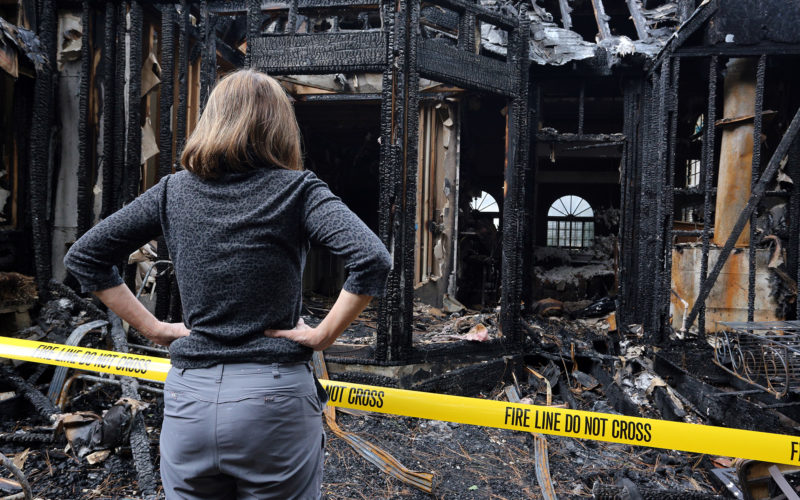Whether you’re evacuating or returning to your home, now is the time to consider insurance matters.
Colorado wildfires erupted across the state late this season as thousands of Coloradans were forced to evacuate in the Cameron Peak, CalWood, Lefthand Canyon and East Troublesome Fires. With wildfires blazing in our state, the Colorado Division of Insurance (DOI) and the Rocky Mountain Insurance Association (RMIA) share insurance advice on evacuations, filing claims and financial preparedness.
On top of the practical tips below, here are three key reminders for our fellow Coloradans, whether they are evacuated, are under a pre-evacuation alert, or already suffered some kind of loss due to a wildfire.
● Know your policy – If you don’t have a copy of your policy, contact your agent or company and request it.
● Keep your receipts – If you are evacuated or displaced for a period of time, be sure to keep copies of all restaurant, hotel and other living expenses incurred because you cannot go home.
● Contact the DOI with concerns and questions – While claims need to be filed with the insurance companies, the DOI can assist consumers with questions about insurance and the claims process. Call the Division at 303-894-7490 or 800-930-3745 (outside of the Denver metro area) or email us – DORA_Insurance@state.co.us.
“Even as we head into the colder months, wildfires continue to threaten many Colorado communities, as this past weekend has shown,” said Colorado Insurance Commissioner Michael Conway. “And undoubtedly, insurance will come into play as property is damaged. We offer these tips and advice to help people start thinking about the insurance processes sooner rather than later.”
“For residents impacted by Colorado wildfires, it is critical to understand the role their insurance plays in evacuations and claims settlements,” said Carole Walker, Executive Director of the Rocky Mountain Insurance Association. “Always put safety first, but COVID-19 health precautions can add another layer of concern about where to go, what to do and how claims are handled before, during and after a wildfire.”
Insurance Evacuation & Claims Advice
If you are under a mandatory evacuation order here’s what you need to know about putting safety first, maintaining COVID-19 health precautions, and what to expect from your insurance coverage and claims filing process.
- New COVID-19 challenges may impact evacuation shelters, lodging availability and claims handling. First and foremost, if you are ordered to evacuate, you need to leave your residence immediately. Listen to orders from local authorities.
- Contact your insurance agent or company immediately to let them know where you are staying and to help you with coverage or claims questions. They can also help assist you with lodging options.
- Most insurance policies cover additional living expenses if you are under a mandatory evacuation and are unable to live in your house or apartment because of a fire or other covered peril. Most policies will reimburse you the difference between your additional living expenses and your normal living expenses, but policies have set limits on the amount they will pay and may be subject to a deductible. Additional living expenses may also provide you with some out-of-pocket money while forced out of your home. Check with your insurance professional about what coverage you have and keep receipts for expenses that may be reimbursed if you file a claim.
- If you are on pre-evacuation alert, it is critical to have an evacuation plan that includes identifying available lodging options such as family or friends, local hotels, shelter locations, insurance assistance with lodging, and pet shelters.
- Take photos or videos of personal possession, particularly antiques, artwork or custom / expensive items. Or if you have time, make a more complete home inventory that lists, or has pictures or videos of, the contents of your home or apartment. It’s easy to get overwhelmed, but most insurance companies now have apps to help simplify the process. You can add digital photos and scan in receipts, along with your room-by room online inventory. But only do these things if you have plenty of time — put safety FIRST.

Returning Home After the Fire
- Don’t delay – Once the danger has passed, if your property has been damaged due to fire and / or smoke, don’t wait to start the claim process by calling your insurance company or agent. Contact the DOI if you need the contact information for your company or agent.
- Document / mitigate the damage – If the damage to your home is extensive, start taking photos of the property and documenting what was lost. Protect from further damage by placing tarps on roofs or boarding up windows, but don’t begin repairs without contacting your insurance company.
- Claims Settlement in the Time of COVID-19 – Insurance companies have implemented safety procedures that address COVID-19 concerns to provide virtual property and inspection opportunities whenever possible in the claim settlement process. If an on-site inspection is required, adjusters are trained in proper safety precautions, including wearing masks, social distancing, and following CDC guidelines.
- Post-Disaster Claims Guide – Information from the DOI & the National Association of Insurance Commissioners (NAIC)
- How to file a property claim – Information from RMIA
- How to file an auto insurance claim – Information from RMIA
- Verify public adjusters – In the aftermath of a disaster like a wildfire, public adjusters may contact you if you have suffered damage to your home. You are not required to hire a public adjuster, but if you do, make sure he or she is licensed and reputable – check references. If possible, hire a Colorado-based adjuster. The DOI licenses public adjusters and consumers can call the Division to verify a license. Public adjusters work on behalf of a consumer and often charge a percentage of the claim amount. The fee is agreed upon in the contract between the public adjuster and the consumer. This cost is not included in the claim amount paid by the insurer.
- Flood Insurance – Now is the time to start thinking about flood insurance. Areas affected by wildfires are under a greater threat for flooding and mudslides due to the loss of vegetation. And the threat can last for many years as the area slowly recovers. Find information about flood insurance and the National Flood Insurance Program (NFIP) at floodsmart.gov, a site from FEMA, or call the NFIP at 800-427-4661.
If you have any questions about insurance – your policy, how things work, or how to file a claim, contact your local Farm Bureau Insurance agent or the Division of Insurance Consumer Services team – 303-894-7490 / 800-930-3745 / DORA_Insurance@state.co.us.

